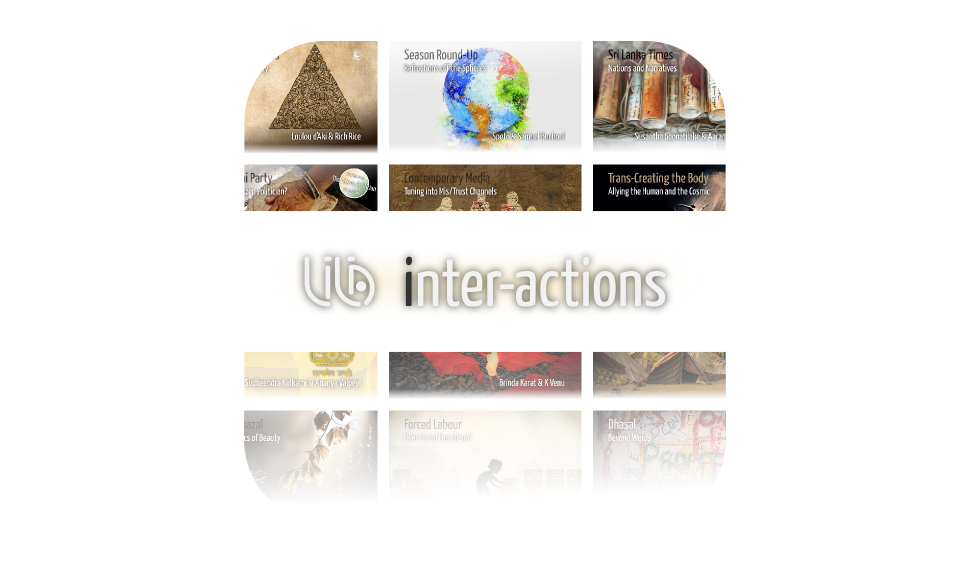

|
|
|
October, 1984: Spectres of Our Past
|
|
Light: Sparks and Streams
|
| Hartosh Bal Singh & Vikram Kapur |
24 October 2014 |
|
Nandivad Rathnasree
& Bhakti Niskama Shanta |
17 October 2014 |
Politics, policy and politeness. How many signs of our past have we turned into “polite meaningless words,” as our historical consciousness makes of the past too comfortable an evidence? Easter, 1916 or the October Revolution, was not meant literally, specifically, punctually: they conveyed processes rather than events, freedom rather than destinies, action rather than observation. On our October, 1984, Satwant Singh and Beant Singh pressed just their triggers, once, twice, but they triggered the complex acceleration of a poisonous turn of events. The chronology of events has become a familiar story for us, but the impatient backward look of the present often forgets the underestimated open-endedness of each incident. Indira Gandhi’s assassination was not simply the consequence of the Operation Blue Star – five full months passed between the two events, and thousands of mindful and patient decisions could have been taken by hundreds of administrators, party leaders, NGO voices, and ordinary citizens, to bridge the gap with the actual, existing spirit of cutural tolerance shared by the millions. Communal agendas are not a structural necessity in a parliamentary democracy; they are the easy game of a political culture understanding governance as reaction, and vision as planning. The thirtieth anniversary of the 1984 Sikh riots, to recall and always vivify our awareness of the tragic risks of uninspired reigns. And to realise that real foresight is a vital ingredient in the synthesis of a society. This week on LILA Inter-actions, Hartosh Singh Bal returns on the recent controversy of the ban of the film Kaum De Heere, to understand today’s climate of ideological filtering as a tragic parody to a genuine culture of dialogue. Vikram Kapur reflects on the incredible gravity that just a few days can have on the lives of millions, for decades, and he finds in the idea of memorials, the many peaceful ways to live with our past.  |
|
Lightful-backlights-uplight-lighter-searchlight-skylight-overlight-inflight-ultralightweight-unenlightened-slightest-lighterage-floodlight-headlight-flashlight-lightplane-lighting-blight-lightly-fanlight-slighting-flightless-lightwood-superlight-lighthouse-slightly-plight-safelight-stoplight-ultralight-lightship-lightning-droplight-daylight-spaceflight-lightless-lightest-earthlight-lightsome-rushlight-lamplight-lights-lightheaded-twilight-taillight-lighten-flights-light-lightproof-lightface-footlights-relight-flight-candlelight-moonlight-lighttight-topflight-postflight-enlighten-starlight-lighthearted-slight-firelight-featherlight-torchlight-alight-gaslight-lightweight-spotlight-lightfast-streetlight-lightish-penlight-trothplight-lowlight-delight-preflight-jacklight-lightbulb-delightful-lighted-slightness-mislight-enlightenment-flighty-deadlight-lightness-droplights-sunlight-limelight-overflight-delighting-houselights-sidelight, and we bring you a Diwali special Inter-actions to LILAight you with two unexpected reflections. Nandivad Rathnasree refocuses our lenses to give us a clear vision of the night sky, beyond the haze of light pollution. Bhakti Niskama Shanta converges the beams of our vision inwards, highlighting the precedence of inner over outer light.

|
|
|
|
Fiji: Lessons in Democratic Creativity
|
|
Internet Slowdown Day: Speeding Access
|
| ManMohini Kaul & Dipti Darshna Swamy |
17 October 2014 |
|
P P Sneha & Hari Shankar Prasad |
10 October 2014 |
Time, once again. But time, this time, with a big H. How often do we actually witness the writing of History? And how often, instead, are our politicians mixing the everyday political with the real visionary breakthroughs? While certain agencies down here overcharge their desire for change unimaginatively, forcefully trying to steal the past, out there, unpretentious nations sit down to prepare the future. After eight years of military rule, Fiji elected its parliament through a remarked democratic transition. Political creativity was put to use to transcend, among other challenges, a century of escalation on the ethnic edge. Thus was reclaimed the Tabua, the traditional whale’s tooth, symbol of peace between parties and communities. Quite a lesson to notice, at a time when the supposed major multicultural societies of our world are still halting on their way to History, burdened that they are with the trite tragedies of communal agendas. This week on LILA Inter-actions, ManMohini Kaul deciphers the recent developments in Fiji and explains why this may truly be a major time for the country, but also for international partners like India. Young Fijian in India, Dipti Darshna Swamy, reflects on her lived experience across the two countries and expresses her aspirations for the new democratic Fiji.  |
|
Last month, on this day, internet browers across the world displayed the proverbial ‘spinning wheel of death’ on thousands of major websites. This emblem appeared as a common-sensical reference, an unambiguous meaning. For the Battle for the Net initiative, this Internet Slowdown Day was meant to warn that any hint of a cyclical time would cause legitimate frustration to our (linear) living and working spaces. While the underlying corporate lobby remains to be confronted and resisted – American telecommunication companies planning to reserve the fastest broadband connections only for top firms – one would not miss that such a tension is exclusive to a particular type of access. We congratulate ourselves for having created the internet, a splendid pathway for a humanity engaging in speed. But, indeed, the democratisation of media and knowledge has given rise to the impression that speed, and therefore time, are commodities accessed through external agencies. While technology’s presence in the world seems ubiquituous, we may forget the extent and depth of cultural heterogeneity, rendering even actual access ineffectual. If the internet is increasingly a component of and for a global world, how can such local challenges be transcended to contribute to a levelling of inter-connected development? This week, P P Sneha explores the possibilities of redefining the idea of access through the channels of education and learning. Hari Shankar Prasad searches our intellectual history to find in the process philosophy of Buddhism the possibility of undertaking an internal journey where one can do more than just stare at time’s cruel wheel.  |
|
|
 |
Gandhi: Experimenting With
|
|
|
| Pritham K. Chakravarthy & Amitabh Mitra |
3 October 2014 |
|
|
|
Can the lived reality of a particular historical figure move societies across time? That is the challenge that Gandhi poses for India. Regardless of our discomfort or disagreement with the choices made by MKG, he is remarkable for the scale of his surrender to the principle of experimentation. At the heart of the idea-action of experimentation is experiri, the desire to try, to assess the validity of ideals through their enactment. And, sixty-six years later, Gandhi remains relevant because hardly anyone has been able – as of yet – to undertake as comprehensively the path of his belief in experimentation. To transform, in other words, the customary rituals, celebrations and other acts of remembrance of this season, into cyclical reminders of the possibility of a deeper individual engagement. Gandhi provokes controversies about his choices, but his method, his approach, his attitude invite us to question, for ourselves, those very choices. The times are asking for us to experiment with Gandhi, still, and Gandhi continues to ask us to experiment with everything. Kicking off our new series of dialogues on belief, this week’s exchange on LILA Inter-actions presents two personal responses to the legacy left by Gandhi. Pritham K. Chakravarthy shifts the focus to the other Gandhi, Kasturba, to assess how visions and beliefs can also provoke suffering to the nearest, when the self remains a hindrance on the road. And Amitabh Mitra reflects on the other reasons that may have engendered the slow disappearance of Gandhi’s sparkle, in his adoptive land of South Africa.  |
|
 |
Disclaimer: The opinions expressed by the writers are their own. LILA Inter-actions will not be responsible for the views presented.
|
Spread the word…
|
|
|
|
|
|
… follow LILA!
|
|
|
|
|
|
|
|
Knowledge is power, and our intention is to bring the power to you. We have initiated a thought movement that aims to strengthen democracy by bringing to you direct voices of important trailblazers and pathmakers, and reclaim deep and patient reflection as an important seed for relevant and sustainable action!
Help us take this movement forward. Support Inter-Actions today for as little as Rs. 100. DonateDonation to LILA is eligible for tax exemption u/s 80 G (5) (VI) of the Income Tax Act 1961 vide order no. NQ CIT (E) 6139 DEL-LE25902-16032015 dated 16/03/2015
![]()

![]()